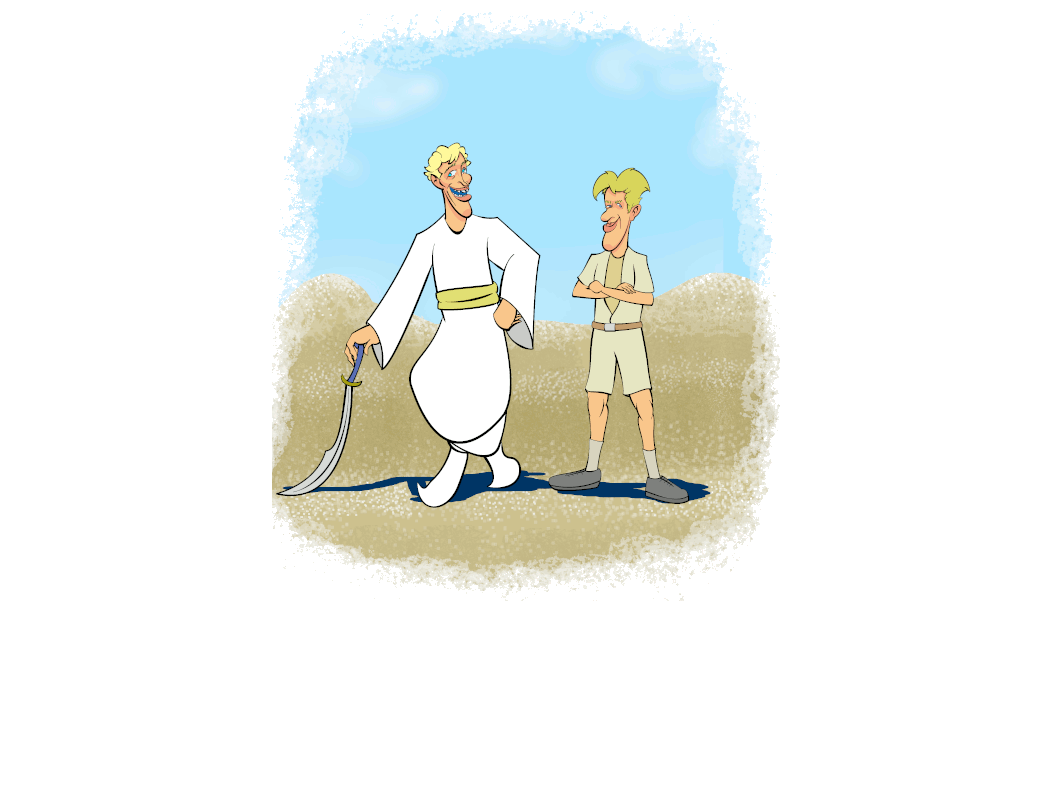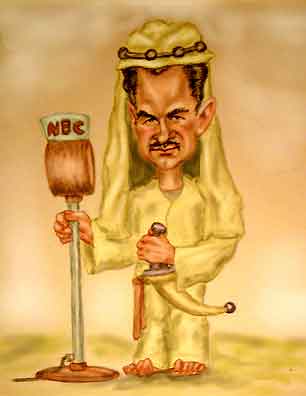Once more we have
The REEL Thing
and the
REAL Thing

(Click to Zoom In)
| "Authentic news has been received that his Highness the Grand Sherif of Mecca, supported by the Arab tribes of West and Central Arabia, has proclaimed Arab independence of Turkey and of Ottoman rule under whose maladministrations and inaction the country has so long suffered." | |
| - | Contemporary Article, 1916. |
| "The [Arab] revolt, originally encouraged by the French and British, enabled the sherif of Mecca to oust the Turkish authorities and to proclaim an independent kingdom with himself as its head." | |
| - | Contemporary Article, 1917. |
| "During the course of the conflict the Arab tribesmen revolted and have since been aiding the allies. Their freedom will be recognized." | |
| - | Contemporary Article, 1918. |
IN THE PERSON OF LOWELL THOMAS IN HIS ILLUSTRATED TRAVELOGUE OF THE BRITISH CAMPAIGNS "With Allenby in Palestine and Lawrence in Arabia" |
|
| - | Contemporary Advertisement, 1919. |
| "Feisul - inspired as always by Col. Lawrence - now took upon himself the difficult task of obtaining the support of the desert tribes. | |
| - | Contemporary Article, 1919. |
| "Lawrence freed Arabia, the Holy Land of millions of Mohammedans." | |
| - | Contemporary Article, 1920. |
| "There's something that bothers me, Drydune. The real Flawrence was 5'5" tall. This guy is over six feet. The real Flawrence was ugly. This guy is handsome." | |
| "See I told you he was confused." | |
| - | "Flawrence of Arabia", Larry Siegel (writer), Mort Drucker (artist), Mad Magazine, April, 1964. |
The student of history will note a most interesting phenomenon. It seems that in the articles written between 1916 and 1918 about the famous Arab Revolt against the remnants of the Ottoman Empire, there's a decided dearth of mention of Thomas Edward Lawrence, "Lawrence of Arabia", who is undoubtedly the most famous figure to emerge from the First World War.
But then in 1919 Lowell Thomas, a former Princeton speech instructor turned war correspondent and later a pioneering news commentator, began presenting a multi-media show complete with live narration, an "Oriental" orchestra, a veiled dancing girl, and illustrated with "lantern" slides and even those new fangled motion pictures. Soon people were reading articles how
THOMAS EDWARD LAWRENCE
FREED ARABIA
DURING THE WAR.
LAWRENCE PLACED HIMSELF AT THE HEAD OF THE BEDOUIN ARMY OF THE KING OF THE HEDJAZ, AND DROVE THE TURKS FROM ARABIA.
HE WAS THE COMMANDER-IN-CHIEF OF AN ARMY OF MORE THAN 200,000 BEDOUINS MOUNTED ON RACING CAMELS AND FLEET ARABIAN HORSES. HE WAS THE TERROR OF THE TURKS.
... and as we said:
LAWRENCE FREED ARABIA, THE HOLY LAND OF MILLIONS OF MOHAMMEDANS.
Lowell based his show on his personal experiences and he maintained that his contact with Lawrence was extensive. From his articles, films, and his book With Lawrence in Arabia, it's easy to conclude that Lowell even accompanied T. E. on some of his war missions. As Lowell said:
"I passed many hours, weeks, months in Lawrence's company..."
T. E., however, had his own spin on Lowell's accounts.
"Lowell Thomas was 10 days in Arabia. He saw me for two of those, and again one day in Jerusalem, and afterwards I breakfasted with him once or twice in London."
With such discrepancies we can understand that there are "revisionist" historians who maintain that - quote - "Lawrence of Arabia" - unquote - was nothing more than a synthetic celebrity product of the early 20th Century crafted via the newly emerging electronic media. Some authors have gone so far as to assert that Lawrence's own account of the Arab Revolt, The Seven Pillars of Wisdom, is replete with invented "adventures" of which only those completely unfamiliar with the Middle East and its terrain would consider credible.
As for T. E.'s own statements like:
My proper share was a minor one ... In reality I never had any office among the Arabs, was never in charge of the British mission with them. Wilson, Joyce, Newcombe, Dawnay and Davenport were all over my head.
... they are easily dismissed as false modesty of a phony, fraud, charlatan, mountebank, and poseur.
Yet despite T. E.'s disclaimer, Lowell Thomas maintained throughout his long life (1892 - 1981) that T. E. actively cooperated with him in crafting his legend. T. E., said Lowell, had a particular genius for "backing into the limelight".
And there is corroboration for Lowell's claim since some of the famous photographs of T. E. decked out in his Arab garments were actually taken in London after the war by Lowell's cameraman Harry Chase. The originals show that the published photographs were skillfully cropped, allowing the viewer to conclude they were taken in Arabia Deserta rather than a few blocks from Piccadilly.

Lowell of Arabia
Well, that settles it. Without Lowell Thomas's media circus the world would never have heard of Lawrence of Arabia.
Lawrence of Arabia? Huh! Might as well say "Lowell of Arabia"!
But yet (to quote Shakespeare) ...
Just when you think everything is done and settled, along comes something to goober up the conclusions. Recent scholars have found that on September 24, 1918 - almost two months before the war ended and well before Lowell began presenting his extravaganzas - an article appeared in the daily newspaper L'Echo de Paris. There we read:
Le colonel Lawrence à la tête de forces de cavalerie qu'il a formées avec des Bédouins et des Druzes, a coupé la voie ferrée à Deraa coupant ainsi les communications entre Damas, Caïffa et la Transourdanie.
... which in reasonably plain English is:
Colonel Lawrence, at the head of the cavalry forces which he assembled with the Bedouins and Druzes, cut the railway line in Deraa thus cutting off communications between Damascus, Haiffa, and Transjordan.
Moreover the article stated:
Aux côtes general Allenby et du colonel français de Piepape, il convient d'ajouter, comme ayant joué un rôle de, tout premier plan dans cette entreprise victorieuse, le colonel Lawrence, qui a mis son experience des chosen du pays et son talent d'organisateur à la disposition du grand chef britannique. Son nom deviendra legendaire en Grande-Bretagne.
... which means more or less:
Alongside General Allenby and the French Colonel de Piepape, it is appropriate to add as having played a leading role in this victorious enterprise, was Colonel Lawrence, who put his experience with the chosen people of the country and his organizational ability at the disposal of the great British leader. His name will become legendary in Great Britain.
Ha? (To quote Shakespeare). What was that last sentence?
His name will become legendary in Great Britain.
Yep. Before Lowell Thomas began tooting his Lawrence of Arabia horn, a newspaper article states that T. E. would become legendary. Not just famous, not just well-known, not just a subject for egg-head professors of history to write about. T. E. would become:
LEGENDARY
in
(To return to the top of the list click here .)
It's safe to say there have been more biographies and books written about T. E. than many other public figures of his (or likely any other) era. Things started out a bit slow, though. Lowell kicked things off in 1924 when he published his book With Lawrence in Arabia which was followed in 1927 by The Boys' Life of Colonel Lawrence, the latter being a version of the first book diluted down for the kids. That year also saw the publication Lawrence and the Arabs published by T. E.'s friend and later Oxford professor Robert Graves who is now most famous as the author of I, Claudius.
Nevertheless there were quite a number of early newspaper stories about T. E. most of which called him by the "Lawrence of Arabia" sobriquet. These continued even after 1922 when T. E. deliberately dropped from sight by enlisting as a private in the RAF as John Hume Ross. But he had to leave after a few months when a reporter broke the story. T. E. then re-enlisted in the Tank Corps as T. E. Shaw, which he took as his legal name. He later was stationed in India and returned to England and continued to serve in the RAF.
In 1935 interest in T. E. spiked with a number of books and articles after his unexpected death at age 46 in a motorcycle accident. But with the events of the 1940's taking precedence, there was a slackening in interest of T. E. with only three books being published during the decade.

Hilda née Doolittle
The 1950's, though, brought a significant blip to the story of T. E. That was from the tell-all "expose" Lawrence of Arabia: A Biographical Enquiry by poet and writer (and husband of Hilda Doolittle) Richard Aldington published in 1954. Originally titled rather pointedly as Lawrence L'Imposteur: T. E. Lawrence, the Legend and the Man Richard's book was the first to state outright that T. E. fabricated the stories where he appeared most heroic.
But what was most titillating was that Richard reported (correctly) that T. E.'s parents, Thomas Chapman and Sarah Junner, were never legally married. Instead the name "Lawrence" was chosen as a way to cover their tracks when Thomas left his wife and five daughters back in Ireland and ran off with Sarah who was the family maid. When the book was published Sarah was still alive - she lived to the age of 98 - and was dismayed to learn that the beans so long concealed had been finally and very publicly spilled.
Some people may wonder if given the circumstances of his birth that "Lawrence" should really be considered T. E.'s legal name. The answer is probably yes, as long as T. E.'s birth and baptism was registered under that name. It is though less certain that Sir Thomas could legally claim the name as he still had to handle much family business back in Ireland under the name Chapman.
On the other hand it is true that T. E. later took the name Shaw and this would be his legal name from then on. According to information provided by a practicing English solicitor, in England you don't need to go through onerous proceedings to start using a new name. You just - to quote - "start calling yourself whatever you want to". The solicitor does, though, point out that there are practical difficulties taking this simple approach. Some financial and government institutions and their procedures - like getting a driver's license - will require a Deed Poll. A properly executed Deed Poll is a document dated and signed by the individual as well as by two independent witnesses that the name has been changed. Some institutions and procedures may also further require the Deed Poll be enrolled which involves a Statutory Declaration by some non-relative who has known you for 10 years and that an Application Notice be published in the London Gazette.1
Footnote
The procedure for a name change is different in Scotland and of course, in the United States things are far more complicated, not the least that name changes are handled at the state, not federal level, and the laws may vary from state to state. According to published guidelines in the United States, you will need to have certain specified documentation proving you are who you say you are and what your new name will be. You will then have to file them with a court. And yes, there is normally a fee involved. Of course, the individual changing their name will have to make sure the change is duly recorded on their personal records and business transactions which may be more onerous a task than the actual name change.
Oh, yes, there are some names that cannot be used. Rude and crass names will usually be rejected as will names that are confusing - such as picking a celebrity's name. Ultimately, what's acceptable is determined by the court after the paperwork is filed.
Richard's book prompted T. E.'s admirers to respond in indignation. Flora Armitage published The Desert and the Stars: A Biography of Lawrence of Arabia which was less critical of the stories where T. E. may have stretched the blanket a bit. Then in 1961 Anthony Nutting, a British MP and later Minister of State for Foreign Affairs under Churchill and Anthony Eden, wrote Lawrence of Arabia. The Man and the Motive. Anthony pretty much accepted Lawrence's own accounts from The Seven Pillars of Wisdom. Then in 1962, Lowell Thomas brought out a new edition of With Lawrence in Arabia.
Despite this renewed interest in T. E., these books didn't reach the in-crowd who were growing up after the Second World War. The truth is as the Fabulous Fifties morphed into the Swinging Sixties few of the younger people even knew who T. E. was. Sure, they knew Elvis, Fabian, the Everly Brothers, Phil and Don, but they didn't know Lawrence of Arabia.

Elvis ...

... Fabian ...

... and Phil and Don
Until the movie, of course. Then the floodgates were opened. If it wasn't for the 1962 mega-blockbuster cinematic extravaganza, Lawrence of Arabia, it's unlikely there would have been the more than 100 additional scholarly books that have been published about T. E. since the movie's release.
But as popular as the movie was for the general public, it was not well received by some who knew T. E. personally. Lowell Thomas called the movie "distorted" and some of the former soldiers who served with T. E. agreed with this assessment.
And yes, there has been comment on the choice of having the 6'3" Peter O'Toole taking the role of the 5'5" Thomas Edward Lawrence, and we must admit T. E. did not have the chiseled features of a Hollywood leading man. But of course the producers wanted a movie that would bring in an audience (and revenue).
If T. E. Lawrence wasn't known by many of the kids who saw the movie, neither was Peter O'Toole. Although he had appeared previously in the movies Kidnapped, The Day They Robbed the Bank of England, and The Savage Innocents, the opening credits in Lawrence of Arabia say:
INTRODUCING
PETER O'TOOLE
AS T. E. LAWRENCE
After the movie became a hit, the critics mused on the irony that a virtually unknown actor was now a candidate for the Academy Award for Best Actor. But even though Peter lost out to Gregory Peck in To Kill a Mockingbird, his next two movies, Becket (with Richard Burton) and Lord Jim, solidified his stardom. Then after he played King Henry II in The Lion in Winter he moved into iconicicity.
But none of the movies ended up as a blockbuster like Lawrence of Arabia. As in most history movies, there was a mix of fact and fiction. One of the movie characters who did not have the actual name of a real-life counterpart was an American journalist named Jackson Bentley. Throughout the desert campaign, Jackson travels around with Peter and Alec Guinness (who played Prince Faisal ibn Husayn2) and takes pictures as Peter, Alec, and the Arab "irregulars" plant bombs under the railroad tracks and loot the wrecked trains that had been carrying the Turkish troops. Jackson of course was a thinly disguise fictionalization of Lowell Thomas who if T. E. is to believed didn't go on any missions and never spent more than a few days total with T. E.
Footnote
Today the usual transliteration of the Arabic name, فيصل, is Faisal (with an a) although in Lawrence's time it was often written Feisal with an e.
The academic transliteration of the name into English is fyṣl or with the added vowels fayṣul. Similary the Arabic name, Husayn, الحسين is sometimes transliterated as Hussein.
The s with the dot underneath, ṣ, is the English transliteration of the letter, ص, ṣād. Arabic has two s sounds, the other one being, س sīn. The letter ص is pronounced as the s in English sod compared to the s in sit, which is Arabic, س. If you pronounced sod you'll notice the tongue is flattened to the roof of the mouth which "palatalizes" the letter. When you say sit, the middle part of the tongue is held lower and it is the tip of the tongue that touches the palate, producing more of a "hissing s" sound.
Peter, despite his rather mild mannered appearance and demeanor, had the reputation of being quite the party animal. Some of his drinking buddies later became famous actors in their own right. Once Michael Caine - who was Peter's understudy in the 1959 play The Long and the Short and the Tall - went to dinner one night with Peter only to wake up in an apartment not knowing how he got there.
"What time is it?" asked Michael.
"Never mind what time it is," answered Peter. "What day is it?"
References and Further Reading
Good Evening, Everybody, Lowell Thomas, William Morrow, 1976.
T. E. Lawrence; by His Friends, Arnold Lawrence (Editor), Jonathan Cape, 1937.
Letters of T. E. Lawrence, Malcolm Brown, W. W. Norton, 1988.
"Lowell Thomas and the Making of a Legend", Clio Visualizing History.
"Bibliography: Books and Book Reviews on T.E. Lawrence", Clio Visualizing History.
"Seven Pillars Revisited: The Myths and Misreadings of T.E. Lawrence", Sam Wilkins, Modern War Institute at West Point, April 15, 2021.
Lawrence of Arabia: The Authorized Biography of T.E. Lawrence, Jeremy Wilson, Heinemann, (1989).
Lawrence of Arabia: The Man and the Motive, Anthony Nutting, Hollis and Carter, 1961.
Lawrence of Arabia: A Biographical Enquiry, Richard Aldington, Collins, 1953.
With Lawrence in Arabia, Lowell Thomas, Hutchinson, 1921.
Seven Pillars of Wisdom: A Triumph: The Complete 1922 Text, T. E. Lawrence, Wilder Publications, 2011.
Revolt in the Desert, T. E. Lawrence, Jonathan Cape, 1927.
Lawrence of Arabia: Mirage of a Desert War, Adrian Greaves, Orion Publishing Group Limited, 2007.
"The True Story of Lawrence of Arabia", Scott Anderson, Smithsonian Magazine, July, 2014.
"Who Was Lawrence Of Arabia?", Imperial War Museum, London.
"Thomas Edward Lawrence Freed Arabia During the War", Lowell Thomas, [Washington, D. C.] Evening Star, February 26, 1920, p. 4.
"Fact-Checking Lawrence of Arabia", Eric Powell, Archeology, July/August 2016.
"Churchill and Lawrence - The Writing of Seven Pillars", Paul Alkon, Finest Hour 119, International Churchill Society, April 25, 2015.
"How the Guardian and Observer covered the Arab Revolt of 1916-1918", Harry Burton, The Guardian, June 6, 2016.
"Losses that Make Turkey Long for a Separate Peace", The [Washington, D. C.] Sunday Star, November 11, 1917, Part 4, p. 3.
"Percy Burton Presents Lowell Thomas with The Last of the Crusaders: Allenby in Palestine and Arabia", The [Washington, D. C.] Evening Star, February 22, 1920, p. 43.
"Capture of Damascus Crowning Triumph in Arabs' Campaign!", Alan Bott, The [New York] Sun, August 3, 1919, Section 3, p 11, Image 35.
"Sense of Humor Once Saved the Life of Thomas Lawrence", The [Washington, D. C.] Evening Star, February 28, 1920, p. 4.
"Lawrence of Arabia: The Man Behind the Robes", National War Museum.
"La débâcle des turque", L'Echo de Paris, September 24, 1918, p. 1.
"With Allenby in Palestine and Lawrence in Arabia", 1919 Advertisement Poster, James A. Cannavino Library, Archives and Special Collections, Marist College, Poughkeepsie, New York.
"Making Lawrence of Arabia", Vyvyan Kinross, Aramco World, January/February 2020.
"Peter O'Toole Takes", Frank Judge, TV Magazine, [Washington, D. C.] Sunday Star, April 7, 1963, p. 2
"Rumor Famous Adventurer Is To Halt Arabs" Stewart Brown, Indianapolis Times, August 30, 1929, p. 3.
"Lawrence of Arabia Is Missing From Post At English Airdrome; May Have Been Sent to Palestine - Mysterious 'Uncrowned King of Arabia' Rumored As On Way to Pacify Moslem Rioters Attacking Jews in Holy Land", New Britain [Connecticut] Daily Herald, August 30, 1929, p. 1.
"Colonel Lawrence Now Buck Private - British Hero-Spy Scrubs Floors - Mystery Surrounds Actions", New Britain [Connecticut] Daily Herald, June 14, 1929, p. 2.
"Lowell Thomas Dons Regal Arabia Kuffieh to Recall His Days with Lawrence of Arabia on High Adventure with Lowell Thomas" Stewart Brown, Sunday Star, TeleVue Magazine, p. 32., March 27, 1959.
"Speeding Target for British Bombers", Brownsville [Texas] Herald, January 3, 1934, p. 2.
"Report Puzzles Famed Mystery Man of Desert", Waterbury [Connecticut] Democrat, January 3, 1934, p. 11.
"British War Hero Dies - Col. T. E. Lawrence Dies of Injuries", [Washington, D. C.] Evening Star, May 20, 1935, p. 8.
T. E. Lawrence: A Biographical Review, Groggy Dundee, Groggy Dundee Production.
"Clue: T. E. Lawrence's Legal Name", Crossword Tracker.
"Peter O'Toole: Raise a Glass to the Last of the 60s Hellraisers", Dominic Rushe, The Guardian, December 16, 2013.
"Lawrence of Arabia", Ngram Viewer.
"Thomas Edward Lawrence", Ngram Viewer.
"T. E. Lawrence", Ngram Viewer.